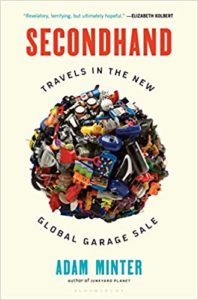Have you “gone Kondo” on your home yet? Have you embraced a minimalist aesthetic? What happens to all the “stuff” that no longer sparks joy in our lives? That’s the subject of this episode. EconTalk host Russ Roberts welcomes author Adam Minter to talk about his book, Secondhand: Travels in the New Global Garage Sale.
The market for “stuff” is likely a lot more complex than you think, as Minter so deftly explains. The markets vary by nation and culture in interesting ways, and has become highly professionalized. If you’re among those who love your “brown furniture and are concerned with its “reverse provenance,” Minter has a reality check for you. The kids don’t want it.

What struck you about this week’s episode? We want to hear from you. Below are our questions for further thought and discussion. We hope you are able to use them to start or continue a conversation.
1- How does Minter explain the growth of the storage and stuff industries? Why is China’s level of waste catching up to that of the US? What does Minter mean when he says, “people are buying themselves out of their homes”? Finally, to what extent do you regard this as a serious problem?
2- Roberts and Minter have an extensive discussion about Goodwill, highlighting its level of sophistication. What most surprised you about this part of the conversation? What does Goodwill have to teach us about the role of brand names?
3- How does the rag industry illustrate “the industrialization of what we do at home”? How are international trade policies affecting the secondhand industry in places such as Rwanda?
4- The conversation concludes with Roberts and Minter musing on the policy implications of “stuff.” What do you think are the most critical implications? To what extent do you believe “planned obsolescence can be eliminated? Can transparency from manufacturers be achieved absent regulation?
Bonus Question: Why is it so hard to get the last little bit of toothpaste out of the tube?


Comments are closed.